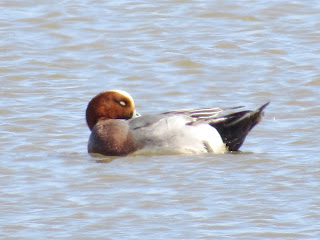 |
| Sedge Warbler |
Back at Cley again. I was here with Mum for a couple of hours while Dad took my younger brother further along the coast so that he could take some soil samples for his geology course. There was a lot of people out on the reserve today. A couple of hides were packed. Was there a rare bird that I didn't know of? No. Just groups of tourist birdwatchers and families enjoying what Cley has to offer during this Easter period. And who could blame them. The sun is out and the sedge warblers and other birds are singing.
 |
| Peacock |
 |
| Cuckooflower |
 |
| St Mark's Fly |
 |
| Shelduck |
From the hides, the pools weren't exactly brimming with waders and wildfowl. It was pretty sparse out there with the birds fewer in number than I expected. Avocets and shelducks dominated what birdlife that I could see. The shelducks, in particular, were in the mood for love as they formed pairs and displayed to one another with their necks arching and producing a topsy-turvy sounding whistling calls.

 |
| Avocet |
 |
| Wigeon |
 |
| Black-tailed Godwit |
 |
| Greylag |
 |
| Ruff |
 |
| Little Egret |
 |
| Little Ringed Plover |
The highlight of today was a little ringed plover that was strolling around one of the islands at Simmond's Scrape. This tiny plover has returned from migration from Africa and it is great to see them back. You can easily distinguish them from their similar looking cousins, the common ringed plover, with that yellow eye-ring around it's eyes, which it's cousin lacks.
 |
| Mediterranean Gull |
Another highlight, if you want to call it that, was the lone Mediterranean gull chilling out with some black-headed gulls and shelducks on one of the larger islands at Pat's Pool. It looks a bit like a black-headed gull, but with a much blacker head, white wingtips and bright red legs and bill, which is also much thicker in comparison. It is a bird you can easily overlook if you don't know your gulls, but if you do, it is a rather exotic-looking species from the Mediterranean. It isn't unusual to see one here though, as there is a few small populations of these gulls dotted along the Norfolk coastline, most notably in Great Yarmouth.

































No comments:
Post a Comment